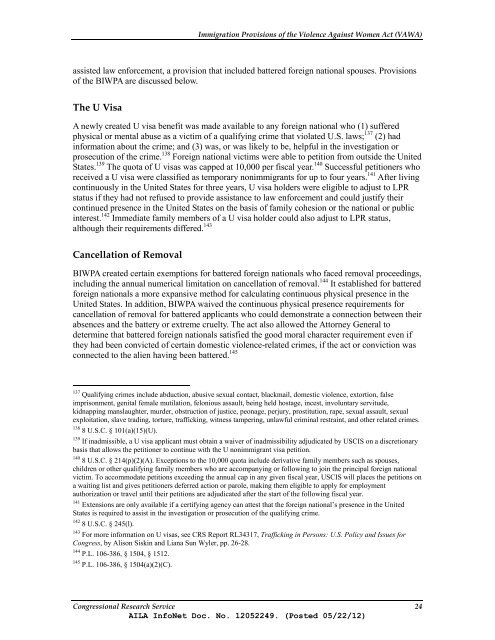Immigration Provisions of the Violence Against Women Act (VAWA)
Immigration Provisions of the Violence Against Women Act (VAWA)
Immigration Provisions of the Violence Against Women Act (VAWA)
You also want an ePaper? Increase the reach of your titles
YUMPU automatically turns print PDFs into web optimized ePapers that Google loves.
<strong>Immigration</strong> <strong>Provisions</strong> <strong>of</strong> <strong>the</strong> <strong>Violence</strong> <strong>Against</strong> <strong>Women</strong> <strong>Act</strong> (<strong>VAWA</strong>)<br />
assisted law enforcement, a provision that included battered foreign national spouses. <strong>Provisions</strong><br />
<strong>of</strong> <strong>the</strong> BIWPA are discussed below.<br />
The U Visa<br />
A newly created U visa benefit was made available to any foreign national who (1) suffered<br />
physical or mental abuse as a victim <strong>of</strong> a qualifying crime that violated U.S. laws; 137 (2) had<br />
information about <strong>the</strong> crime; and (3) was, or was likely to be, helpful in <strong>the</strong> investigation or<br />
prosecution <strong>of</strong> <strong>the</strong> crime. 138 Foreign national victims were able to petition from outside <strong>the</strong> United<br />
States. 139 The quota <strong>of</strong> U visas was capped at 10,000 per fiscal year. 140 Successful petitioners who<br />
received a U visa were classified as temporary nonimmigrants for up to four years. 141 After living<br />
continuously in <strong>the</strong> United States for three years, U visa holders were eligible to adjust to LPR<br />
status if <strong>the</strong>y had not refused to provide assistance to law enforcement and could justify <strong>the</strong>ir<br />
continued presence in <strong>the</strong> United States on <strong>the</strong> basis <strong>of</strong> family cohesion or <strong>the</strong> national or public<br />
interest. 142 Immediate family members <strong>of</strong> a U visa holder could also adjust to LPR status,<br />
although <strong>the</strong>ir requirements differed. 143<br />
Cancellation <strong>of</strong> Removal<br />
BIWPA created certain exemptions for battered foreign nationals who faced removal proceedings,<br />
including <strong>the</strong> annual numerical limitation on cancellation <strong>of</strong> removal. 144 It established for battered<br />
foreign nationals a more expansive method for calculating continuous physical presence in <strong>the</strong><br />
United States. In addition, BIWPA waived <strong>the</strong> continuous physical presence requirements for<br />
cancellation <strong>of</strong> removal for battered applicants who could demonstrate a connection between <strong>the</strong>ir<br />
absences and <strong>the</strong> battery or extreme cruelty. The act also allowed <strong>the</strong> Attorney General to<br />
determine that battered foreign nationals satisfied <strong>the</strong> good moral character requirement even if<br />
<strong>the</strong>y had been convicted <strong>of</strong> certain domestic violence-related crimes, if <strong>the</strong> act or conviction was<br />
connected to <strong>the</strong> alien having been battered. 145<br />
137 Qualifying crimes include abduction, abusive sexual contact, blackmail, domestic violence, extortion, false<br />
imprisonment, genital female mutilation, felonious assault, being held hostage, incest, involuntary servitude,<br />
kidnapping manslaughter, murder, obstruction <strong>of</strong> justice, peonage, perjury, prostitution, rape, sexual assault, sexual<br />
exploitation, slave trading, torture, trafficking, witness tampering, unlawful criminal restraint, and o<strong>the</strong>r related crimes.<br />
138 8 U.S.C. § 101(a)(15)(U).<br />
139 If inadmissible, a U visa applicant must obtain a waiver <strong>of</strong> inadmissibility adjudicated by USCIS on a discretionary<br />
basis that allows <strong>the</strong> petitioner to continue with <strong>the</strong> U nonimmigrant visa petition.<br />
140 8 U.S.C. § 214(p)(2)(A). Exceptions to <strong>the</strong> 10,000 quota include derivative family members such as spouses,<br />
children or o<strong>the</strong>r qualifying family members who are accompanying or following to join <strong>the</strong> principal foreign national<br />
victim. To accommodate petitions exceeding <strong>the</strong> annual cap in any given fiscal year, USCIS will places <strong>the</strong> petitions on<br />
a waiting list and gives petitioners deferred action or parole, making <strong>the</strong>m eligible to apply for employment<br />
authorization or travel until <strong>the</strong>ir petitions are adjudicated after <strong>the</strong> start <strong>of</strong> <strong>the</strong> following fiscal year.<br />
141 Extensions are only available if a certifying agency can attest that <strong>the</strong> foreign national’s presence in <strong>the</strong> United<br />
States is required to assist in <strong>the</strong> investigation or prosecution <strong>of</strong> <strong>the</strong> qualifying crime.<br />
142 8 U.S.C. § 245(l).<br />
143 For more information on U visas, see CRS Report RL34317, Trafficking in Persons: U.S. Policy and Issues for<br />
Congress, by Alison Siskin and Liana Sun Wyler, pp. 26-28.<br />
144 P.L. 106-386, § 1504, § 1512.<br />
145 P.L. 106-386, § 1504(a)(2)(C).<br />
Congressional Research Service 24<br />
AILA InfoNet Doc. No. 12052249. (Posted 05/22/12)







